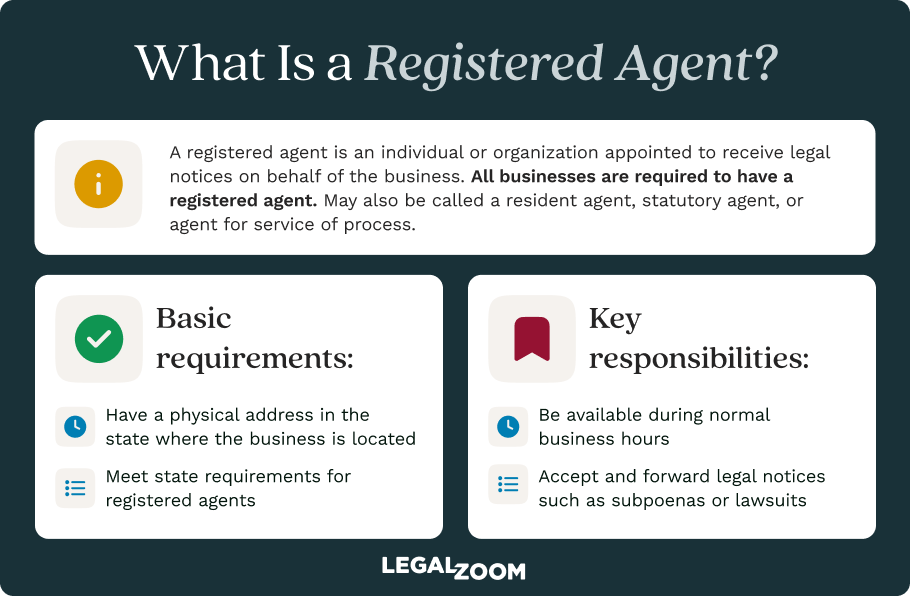One of the most important first steps in starting a business in Michigan is selecting a registered agent. Michigan law requires all registered business entities to maintain a registered agent with a physical address in the state, including LLCs, corporations, nonprofits, partnerships, and any other business that files formation documents with the state.
This comprehensive guide covers everything you need to know about choosing a Michigan registered agent, including requirements, costs, and procedures.

What is a registered agent?
A registered agent is a person or company assigned to receive legal documents and other official correspondence for your business. In Michigan, this role is also referred to as a resident agent.
Your Michigan registered agent serves several critical functions, but the most important is accepting critical communications from the government and court, including:
- Service of process: Legal documents such as lawsuits, subpoenas, and court notices
- State compliance notices: Correspondence from the Michigan Department of Licensing and Regulatory Affairs (LARA) and the Corporations Division
- Official business mail: Cease and desist letters, tax notices, and other time-sensitive documents
Michigan Compiled Laws (MCL) § 450.4207 for LLCs and MCL § 450.1241 for corporations mandate that all business entities include both a resident agent and a registered office address in their formation documents filed with LARA.
Who can be a registered agent in Michigan?
A business or individual can be a registered agent in Michigan as long as they meet the state requirements:
- Individuals acting as a resident agent must be at least 18 years old and reside in Michigan.
- Businesses providing registered agent services must be licensed to transact business in Michigan.
- Individuals and businesses must have a physical street address in Michigan (a P.O. box is not sufficient).
- Individuals and businesses must be available during normal business hours (usually 9 a.m.–5 p.m., Monday through Friday) to receive and sign for deliveries.
Can I be my own registered agent in Michigan?
Yes, according to Michigan state requirements, you can serve as your own registered agent as long as you meet the eligibility criteria. However, this decision comes with both benefits and risks.
Benefits of being your own registered agent
- Cost savings. Being your own agent eliminates annual registered agent service fees, which typically run $100–$300+ per year.
- Direct control. You’ll have immediate access to all legal documents and correspondence and don’t need to rely on a third party.
Risks and limitations
- Availability. You must be physically present at your registered address during all business hours.
- Privacy. Your business address becomes part of public record. If you operate out of your home, this means your home address.
- Service of process exposure. You may be served with legal documents at your home or business location in front of customers or employees.
- Travel restrictions. You may miss essential communications while traveling or working off-site.
- Missed deadlines. If you miss correspondence, you risk missing time-sensitive legal documents that require immediate response.
How to appoint a registered agent in Michigan
Appointing a registered agent in Michigan is required before you can file your business formation documents with LARA. Here's the step-by-step process:
Step 1: Choose your registered agent
Decide whether you'll serve as your own registered agent or hire a professional service. Ensure your chosen agent meets all Michigan requirements.
Step 2: Complete formation documents
When filing your articles of organization (LLC) or articles of incorporation (corporation), you must include:
- Resident agent name: Full legal name of the individual or business entity serving as your agent
- Registered office address: Complete physical street address in Michigan
- Mailing address: Address where the agent can receive service of process, if different from the business street address
Step 3: File with Michigan LARA
Submit your formation documents to the Michigan Department of Licensing and Regulatory Affairs. You can choose to use LARA's online filing system at michigan.gov/lara. Or, you can mail your completed forms to:
Michigan Department of Licensing and Regulatory Affairs
Corporations, Securities & Commercial Licensing Bureau
P.O. box 30054
Lansing, MI 48909
How to change your registered agent in Michigan
There are many reasons why you may need to change a registered agent. For example, your current agent may no longer be available during business hours or you may decide to switch from an individual agent to a professional service. To do this, submit a Certificate of Change form with LARA and include the $5 change fee.
If you choose to switch to LegalZoom for registered agent services, we will take care of the paperwork and cover the filing fee for you.
You can also choose to change your agent when filing your annual report or annual statement. Keep in mind that if your agent information changes, you should not wait until annual report season to inform the state, because correspondence will continue to go to the old agent or office until public records have been updated.
How much does a Michigan registered agent cost?
The cost of registered agent services in Michigan varies depending on whether you choose to serve as your own agent or hire a professional service. Serving as your own agent can save a lot of money, however, you risk racking up penalties for missed deadlines if you fail to serve your role appropriately.
Professional registered agent services, on the other hand, may incur annual fees of $100 to $300+ per year. Some professional agents include additional services that can be a benefit to your business, such as:
- Mail forwarding
- Compliance deadline reminders
- Document scanning and digital storage
- Junk mail filtering
LegalZoom offers all of the above as part of our registered agent services for just $249 per year. Our registered office in Flint meets all state requirements.
FAQs about Michigan resident agents
What happens if you don't maintain a registered agent in Michigan?
Failing to maintain a registered agent in Michigan can result in serious consequences for your business. Legal documents may not be properly served, potentially resulting in default judgments or compliance violations and administrative penalties. You also run the risk of losing good standing status with the state, which could ultimately lead to the dissolution of your LLC or corporation.
What if my registered agent resigns?
If your registered agent resigns, they must provide written notice to your business and may also notify LARA. You have a limited time to appoint a new registered agent before facing compliance issues. It's crucial to act quickly to avoid administrative penalties or missing important correspondence.
Do foreign LLCs need a Michigan registered agent?
Yes, if your LLC was formed in another state but is registered to conduct business in Michigan, you must register as a foreign LLC and appoint a Michigan registered agent. This requirement applies to any out-of-state entity that has a physical presence, employees, or conducts regular business activities in Michigan.
What happens if my registered agent moves out of Michigan?
If your registered agent moves out of Michigan, they no longer meet the residency requirement and must be replaced immediately.
Can a registered agent serve multiple businesses in Michigan?
Yes, both individual and business registered agents can serve multiple Michigan entities simultaneously, provided they can fulfill their obligations to each client. Professional registered agent services routinely serve hundreds or thousands of businesses.
Are registered agent records public in Michigan?
Yes, registered agent information is part of your entity's public record maintained by LARA. This information is accessible through the Michigan business entity search database and includes the agent's name and registered office address.
Susan Thomas contributed to this article.


